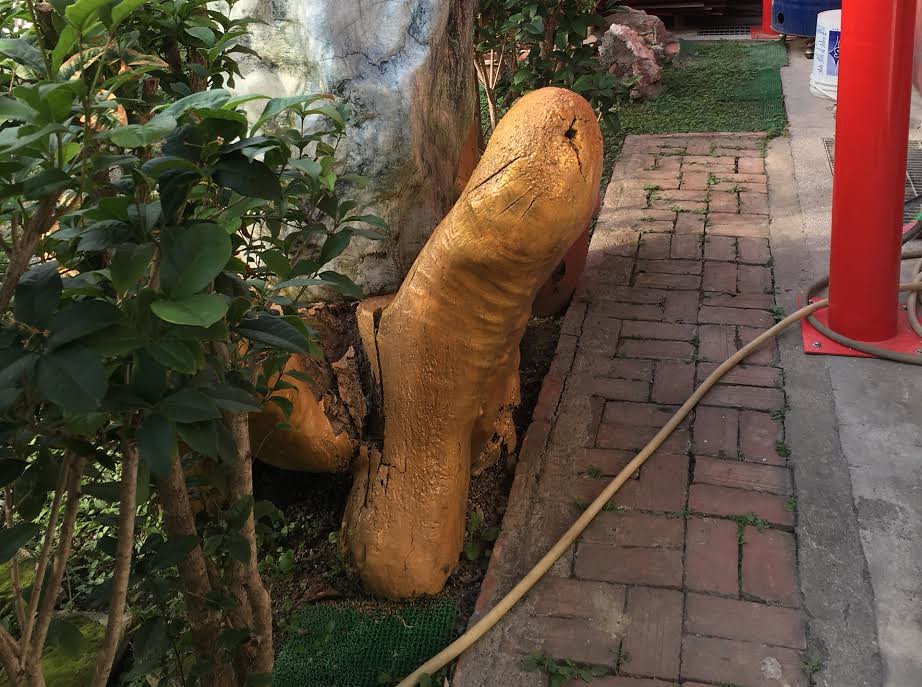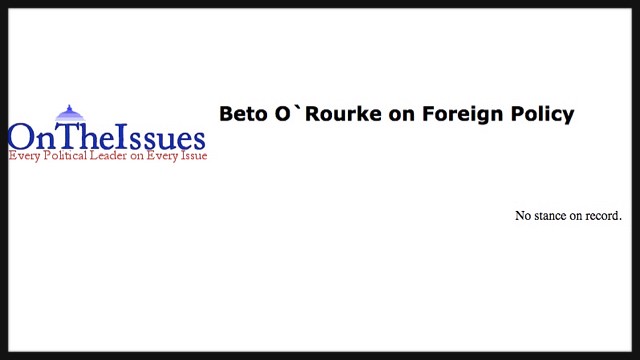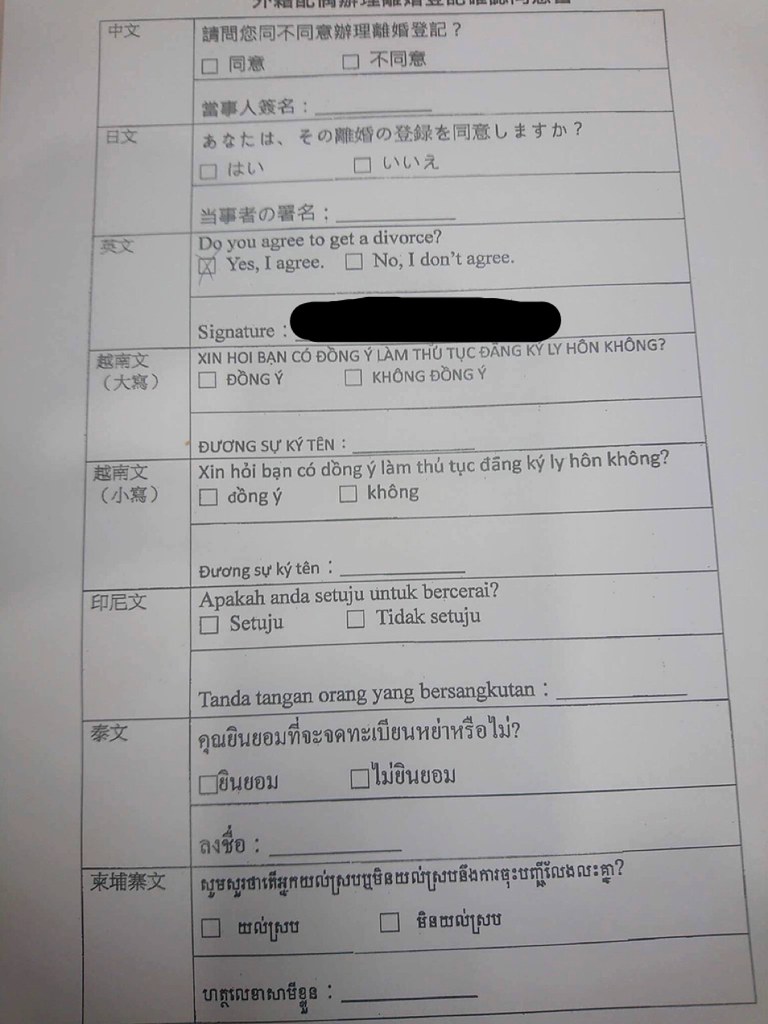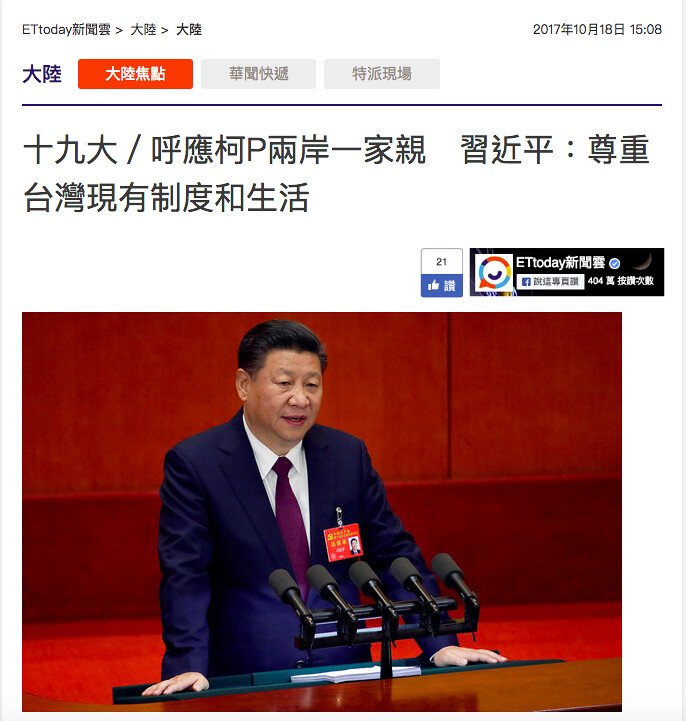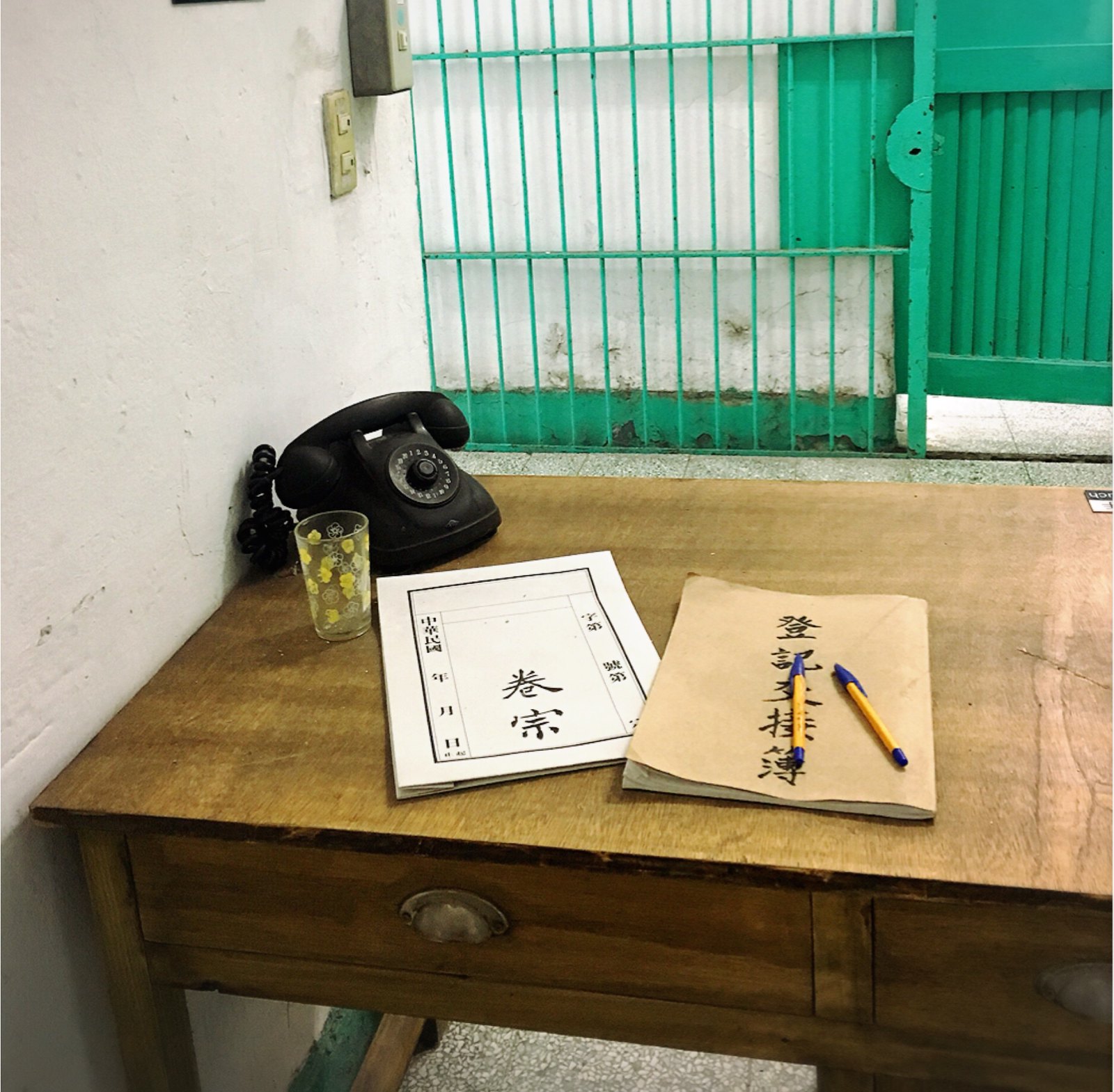As a long-termer in Taiwan, it's a common disappointing occurrence to read an absolute horrorshow of an opinion piece about this country, thinking "well this is pretty crap, but it's probably by some nobody who just doesn't know what they're talking about", then get to the end only to find out that the writer is an accomplished scholar (though not in any field that has anything to do with Taiwan) and as such, people will actually take them seriously.
That's exactly what happened a few days ago in Deutsche Welle, when this mess was splattered across its website: Taiwan, China share common heritage, chequered history
You know something like this is going to be painful to read when even the title gets basic facts wrong: Taiwan and China do not share a common heritage in the way readers are intended to infer. The common trope is that Taiwanese and Chinese culture are 'the same'. They're not - Taiwanese culture certainly contains much Chinese influence, but it also contains heavy strains of indigenous, Japanese and Southeast Asian culture lacking in China - if 'Chinese' culture can be said to be one cohesive thing at all, which it isn't.
All in all, reading this thing was like listening to glass slowly crack and burst: you'd think for someone whose scholarship is specifically in the field of narratives and ideologies would have more to say about Taiwanese, rather than Chinese, narratives - and know a marginalized narrative when he sees one - but apparently not.
With that in mind, let's dive in. I say we start with what's good about the piece. You know, to whet our appetites for the bloodbath to follow.
Because one thing is certain: neither will Taiwan reclaim mainland China, nor will the People's Republic occupy and undermine Taiwan.
Let's leave aside "neither will Taiwan reclaim mainland China" - both that "mainland" is a made-up word by people in power to impose a certain narrative of what is mainland and what is territory off that mainland, and that Taiwan ever had China (it didn't - the ROC did, but Taiwan did not) - and look at the second half of that sentence. That's nice.
I mean, nice just like I suppose it's nice if you're trapped in the desert dying of dehydration and you find a muddy puddle and lick it just to get some water, only for it to give you bilharzia. But hey, you got some water! Nice!
Today Taiwan is a modern, open and tolerant democracy. It has nothing in common with the dictatorship that the Kuomintang had brought to the island when they arrived in 1949.
Yeah, okay, sure. Why couldn't you keep this thread going, Professor Görlach? Why'd you then have to take that former dictatorship's definition of what Taiwan is as the whole truth about Taiwan, despite the government itself being foreign (Taiwan was Japanese when the KMT arrived) and, at the time they consolidated themselves and their ideology about Taiwan, not representative of the Taiwanese people? You should know better.
The island is, after all, one of Germany's and the European Union's most important trading partners. Taiwan, once again, exemplifies the success of the democratic model: political and economic freedoms go hand in hand and eventually lead to prosperity and harmony. Despite our friendship with China, Taiwan will thus remain a special ally among the Asian states.
Cool story bro. So, how about some diplomatic support in the face of Chinese aggression up in here?
Also, not so sure about the harmony but the blue and green camps aren't exactly killing each other (anymore - one side used to routinely kill the other), so...fine.
Okay, that's enough. Time for blood.
During my time in Taiwan, I realized that the young generation dissociates itself from that heritage. The Civil War, which ended in 1949, is far away. Hence, they consider themselves Taiwanese rather than Chinese.
Wait...what?
You think the young generation doesn't identify as Chinese because the Chinese Civil War was a long time ago? Have you actually asked any young Taiwanese - or any non-KMT Taiwanese at all - why they identify as Taiwanese? If you did, what do you think they'd say?
I have asked, so I'll tell you what they've said to me: that it has nothing to do with any civil war in China or ROC ideology, and everything to do with the fact that Taiwanese history and culture are simply different from China's. From an island of indigenous tribes, to a history of colonization by European powers, Chinese powers and Japan (yes, Chinese presence on Taiwan was, and is, colonial), to a modern history that has sharply diverged from China's, Taiwanese history is its own unique thing. In terms of culture, this is harder to quantify, but Taiwan just feels like a place influenced by both Japan and China, and has an entirely different cultural feel from China despite the two cultures' similarities. It's like going to the US from Europe. Even the language (Mandarin) is a colonial one. Until the post-1949 language policies of the KMT began to have an effect, the native languages of Taiwan were numerous, and none of them Mandarin.
Is it so hard to believe that the Taiwanese identify as Taiwanese because the attempted brainwashing of those in power - so that they could stay in power - didn't work? That there's something real to it, and it is about remembering history rather than forgetting it?
Dealing with 'transitional justice'
As a German, I'm well acquainted with this gimmick: during the post-World War II period, both German states — the democratic West Germany and the communist East Germany — considered themselves to be legitimate representatives of the "one Germany."
And I'm well-acquainted with this gimmick: positioning the word "gimmick" very close to another term in scare quotes, to imply that you think the term is bullshit.
You wanna go ahead and own that? That you think things like letting families finally read the goodbye letters their long-dead relatives wrote before their (unlawful and unfair) executions is a "gimmick"? That opening records that were only sealed so the party responsible wouldn't have to face justice for what they'd done is a "gimmick"? That the historical narrative finally echoes what really happened - is that a "gimmick" too? That untold sums of money were confiscated, swindled or outright stolen from Taiwan and the Taiwanese by that same party, and only now does it seem they won't be able to keep their loot - is that a "gimmick" too?
All I can say is I'm happy your opinion doesn't mean anything in Taiwan.
The rest of the world should appeal to moderation on both sides of the conflict.
Ooooooohh, nice job implying very subtly that identifying as Taiwanese - which is something most Taiwanese naturally do and have done for decades (some for far longer) - is somehow not moderate, and therefore must be an extreme position.
I see through the ruse, but nice try. I commend you, sir, for your attempted chicanery.
I had just completed my tenure at a university in Cambridge on the US East Coast when I arrived at National Taiwan University to take up the position of visiting scholar. Most certainly, I arrived with an understanding of how complex and painful the aftermath of a civil war can be.
Sure, but remember, the only reason that civil war ever came to Taiwan's shores was because one side took it there. It had nothing at all to do with the millions of Taiwanese who, until just a few years previously, had been Japanese subjects. The warring ideologies of that war were so far removed from a local Taiwanese context that, to be frank, it feels like an accident of history that it ever became a part of the Taiwanese narrative at all.
I reencountered much of this in Taiwan. The island state has its origins in the Chinese Civil War. In 1949, the defeated Kuomintang party of Chiang Kai-Shek retreated to the island. They remained convinced that they were still representing the real China that had become a republic under their leadership only a few decades ago.
So, before the 1940s, Taiwan didn't exist? Huh - I had thought Sun Yat-sen caused it to be raised from the ocean floor in 1911, but apparently it was several decades later, when Chiang Kai-shek took the magic tome, said the appropriate incantations to the gods, and made it so that Taiwan came into being where there had once been nothing but open sea. Ya learn something new every day!
(Yes, yes, I know he's talking about the "ROC on Taiwan" here, but he said "Taiwan". You may be surprised to learn that Taiwan did, in fact, exist as a unique entity long before the Chinese Civil War. Its entire history was colonial, but it did exist as a place one could refer to as itself rather than part of a larger whole.)
For the coming decades, the notion of reclaiming mainland China remained a crucial part of their rhetoric — despite the fact that their large neighbor was already on its way to becoming an economic superpower. The People's Republic of China on her part considers the island republic a renegade province.
Okay, so we get the KMT's view, but no sense of what actual Taiwanese thought about this whole thing or about China (remember, in those decades the KMT quite assiduously avoided identifying as Taiwanese. Many still don't.) So we get two perspectives from two Chinese regimes, and nothing at all about the perspectives of the vast majority of people in Taiwan who, until the KMT came, had had little to do with China besides having had a few distant ancestors come from there.
Let's also keep in mind that the definition of what Taiwan is, according to Görlach, was created by a political party that is not currently in power, because the people of Taiwan decided they didn't like that narrative. How can anyone say that this is the story - of a common household torn asunder - that truly represents Taiwan?
For someone who has written so extensively on the importance of liberal democracy and how ideological narratives shape identity, it's interesting that Görlach does exactly what both China and the KMT want him to do by excluding the most marginalized narrative in this story, giving prominence to the stories woven at odd, tangential angles to the truth by those in power who are trying to keep (or expand) their power.
As always, when the victors and the defeated interpret their history, conflicts arise. Only in 1992 did both parties finally agree to accept the notion of "one China," although differences in its conception persist.
Again, more of China and the KMT's view, nothing about what the Taiwanese think. Also, he reifies the 1992 Consensus just as so many hack journalists do. The 1992 Consensus is a fabrication: if differences in what "one China" mean persist, then that's not a consensus! In any case, we already know the term was basically a post-hoc fabrication meant to perpetuate a notion of what is and is not 'China' in the face of changing Taiwanese views on their own culture and history.
Even if the 1992 Consensus were a real thing - and it's not - the parties that would have agreed to it were not democratically elected. This arguably matters more on the Taiwan side: how can Görlach imply, as he does here, that something that is claimed to have happened in 1992, with the Taiwan side represented by unelected officials sent by a government that had not yet fully democratized, should be taken as the position of "Taiwan", a country whose liberal democracy he himself praises?
What could the experiences of both the United States of America and the Federal Republic of Germany mean for the conflict between the People's Republic of China and Taiwan? First and foremost, it signals that both sides should continue their work on the consensus of 1992 to pave the way for a better future. Neither side should be forced to lose face in this process.
THAT IS ONLY TRUE IF THE 1992 CONSENSUS IS REAL WHICH IT IS NOT.
Seriously, for a professor I'm astounded at how little homework Görlach has done on the so-called 1992 Consensus.
Also, again, what's up with claiming the KMT narrative of Taiwan ultimately being Chinese, and not paying any attention at all to the more globally marginalized narrative of the vast majority of Taiwanese who feel differently? How is a better future only possible if we take the KMT and Chinese narratives as the only ones that matter, and ignore what the Taiwanese actually think about their own damn country, and acquiesce to the idea that Taiwan is, in fact, a part of China?
Is it really so easy to throw away all those years of writing about narrative, political policy, ideology and liberal democracy and say that because the KMT wants to hold on to power, and China is super aggressive, that this whole other idea that Taiwan is not a part of China, and never really has been for any length of time that matters can just be ignored?
Is it so easy to discount the voices of the 20-million-plus people who have been saying emphatically for years that their ancestors may have come from China, but that they are Taiwanese?
Is it so easy to throw out the idea that a just world - and Görlach seems concerned with justice - would offer a solution that allows for both Taiwanese independence and peace, which most Taiwanese (and I would gather most Chinese) want?
Görlach talks about losing face (aww, we have a budding wannabe Confucius on our hands - adorable) - but the ultimate loss of face is Taiwan being told that it is Chinese, because some people in power decided to create an agreement from thin air that it was so.
The People's Republic of China won the Civil War. It is in China's interest to interpret the outcome of the war in its own words. In this regard, the country is not acting exceptionally. That provides context, but does not excuse Beijing's behavior. The Chinese leadership under President Xi Jinping has not shown any intention of restoring the wisdom and harmony between the two unequal siblings. Should that happen in the future, the People's Republic of China will have achieved its goal of becoming a distinguished and responsible actor on the international stage.
Let's leave aside that the Communists and Nationalists - one-party leaders of the PRC and ROC, respectively - were the ones engaged in this war, not any actual Taiwanese (the descendants of those ROC soldiers who came to Taiwan are Taiwanese, but the soldiers themselves mostly fought this war in China.) This is a Chinese war, not a Taiwanese one, but whatever.
I wanted to like this paragraph, because he's calling on Xi and the entire People's Republic of China to basically stop being such massive assholes, and that's great. But...the only way one can think of Taiwan and China as siblings is if you've already swallowed the notion that Taiwan and China are, in fact, siblings. And that means taking China's, and the KMT's, narratives about Taiwan at face value, never once questioning the perspectives pushed by those in power to try and define (and by defining, control) that which they wish to rule, and never even considering that another, more democratic, more ethically correct, more modern and liberal perspective - Mr. Esteemed Liberal European Professor Sir - even exists, let alone interrogating it.
Or even just asking the people who live that other perspective daily why they think the way they do. That would be enough, but he didn't even do that.
I'll do it for him - I talk to a lot of young Taiwanese. I often ask them about their views on history, or even just how things work in their country (it's actually something I have to do in my line of work).
While I've gotten a few young Taiwanese who do identify as Chinese, not even once, over talking to hundreds if not thousands of young Taiwanese adults, has anyone ever taken my question about their "country" to mean "China". It is always - every single time - taken to mean "Taiwan".
It has literally never happened. Truly, not once. And I doubt it ever will, regardless of what some unelected powerful dudes say they said in 1992.
So on what planet do you, Alexander Görlach, think that it would be natural, preferable or right for the Taiwanese - not the KMT, not that ROC government that came from China and whose status on Taiwan is, by international law, undetermined - but the Taiwanese, to think of themselves and their beautiful island as a part of China?
This is all the more disheartening because Görlach seems from his curriculum vitae and academic interests to be someone who ought to see through the smokescreens put up by people in power to try and keep that power: that is, he should be someone most qualified to look beyond what China says about Taiwan's 'Chinese' heritage, and see it for the attempt at a territorial annexation claim that it is. He should be able to look at the KMT's similar attempts to paint Taiwan as 'Chinese' as well, and see that for what it is too: an attempt by those in power to control the narrative for everyone else, and to keep marginalized voices firmly on the sidelines. He should know enough about critical Han studies to know that any attempt by those two sides to paint 23.5 million people whose minds they do not control and whose history they can no longer revise as 'Han', and therefore as ultimately members of a greater 'China' in which there is a 'mainland' and an 'island' (Taiwan), are simply attempts, again, at power trying to grab more power, and set the narrative for everyone else based on what benefits them.
But he doesn't. He sounds like just another Chinese shill, and that disappoints me. He could have done better, but didn't. He's one of the smart ones, but this op-ed is so painfully, out-of-tune dumb, it hurts the ears.
Görlach may be a great academic in his field, but it's painfully clear from reading this conflagration of bad ideas that he doesn't know the first thing about Taiwan, and cannot be said to be anything of an expert on Taiwanese affairs.
Oh, and don't look at the captions in the slideshow below. I don't even have the energy to deal with those.
